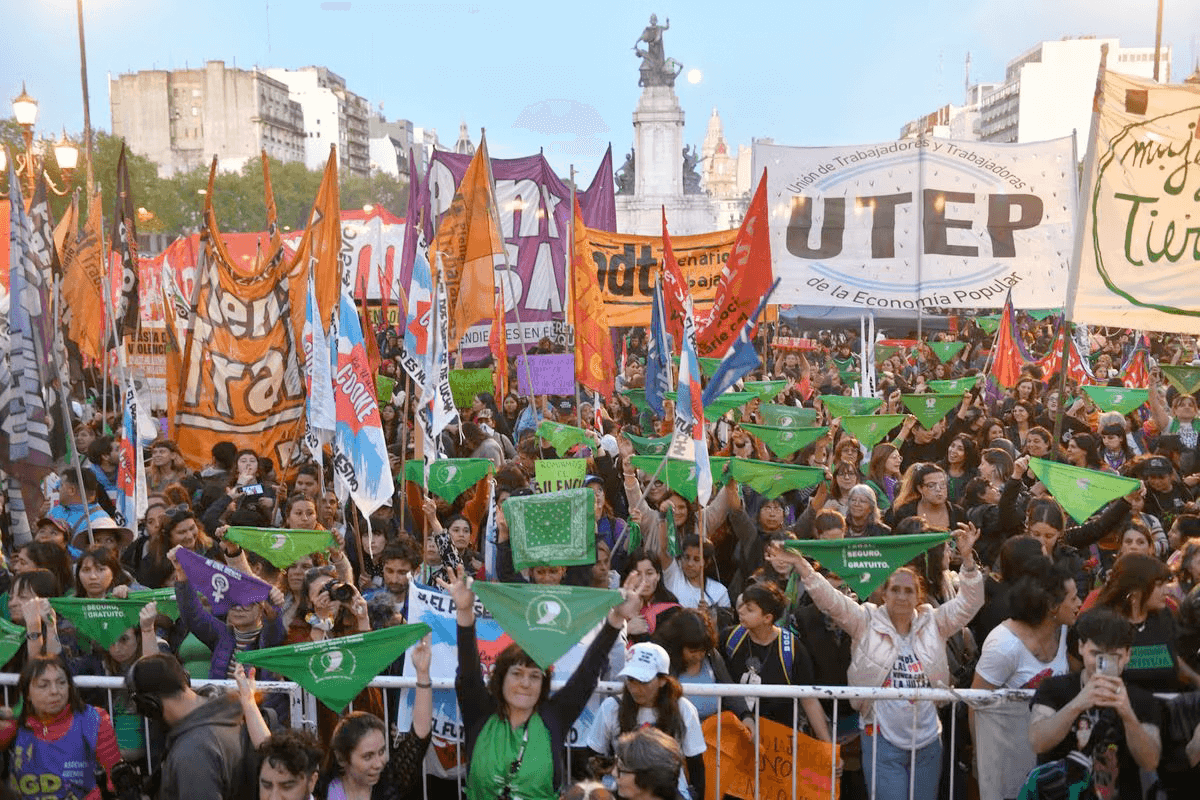
Far-rightwing, anti-women’s rights candidate, with no political experience, wins Argentine election and threatens to make abortion illegal again, among much more
Javier Milei, the far-right presidential candidate in Argentina, who was leading in the polls ahead of the general elections and then won on 22 October, promised among other things to eliminate the Ministry of Women, repeal the 2020 law that legalized abortion and put an end to other rights won by women. In response, thousands of people in different cities across the country took to the streets (see photo above) to make it clear that they will fight for their rights. The march, the largest women’s demonstration since the end of the pandemic, was called to mark International Safe Abortion Day on 28 September.
In addition to reproductive rights, the protesters also defended the 2006 law which recognises students’ right to comprehensive sex education. Milei, leader of Libertad Avanza (Freedom Advances), has attacked that law, arguing that sex education should not be mandatory at school. A teacher who runs a course in sex education told the journalist that “The contents are written by specialists. We do not teach anything, nor do we indoctrinate or teach them to be gay or trans. We teach them that there is not only the heteronormative way. It’s very dangerous that they can repeal the law.”
Nina Burga, age 79, an iconic figure in Argentina’s women’s movement, said: “Today we have come out not only because the rights we have achieved are in danger, but also because labour laws, public health and public education are at risk. It is essential that women in the country take to the streets.”
One of the signs on the march read: “Freedom is 80% of children who suffered abuse being able to tell others about it thanks to comprehensive sexual education.”
Different analysts attribute the low voter turnout in the election to citizens’ democratic disillusionment with a political class that has not yet resolved their main problems, and which successive governments of different political stripes have not managed to overcome, including poverty, inflation, the country’s economic crisis and insecurity. A country where more than 40% of the population has lived in poverty for years, where six out of every 10 children and teens are poor and where having employment, even formal employment, is not enough to guarantee a basic income.
Women are affected by this situation more deeply, as is often the case. They are over-represented among the most disadvantaged sectors of society; they are more likely to have informal or part-time employment; they are generally in charge of single-parent households and in 50% of cases, even if they are entitled to money for their sons and daughters, they are unable to collect these payments. One in two women experience violence at the hands of their partners, in a country where there is a victim of femicide every 39 hours. For these women, seeking help from the justice system usually means submitting to a labyrinth of bureaucracy that does not necessarily manage to protect them even from the more extreme forms of violence.
The author of the article wrote: “The primary elections leave a worrying message: rights seem like an empty concept for many people who watch in fear as their daily lives crumble in a seemingly unending economic crisis. However, at a time when reality hits harshly in the face of so many unresolved injustices, it is necessary to remember that rights are not just a rhetorical question but a tool of struggle, of enforceability, that can contribute to collective organisation in the face of a reality that confronts us with threats and setbacks.
“As part of a group that has been the protagonist of the milestones that we define as cornerstones of democracy, it is necessary to question these empty slogans to look ahead to the future. For this reason, we propose to continue challenging the women and men of the political class, and society as a whole, to resist the threats of regression, to continue searching for feasible solutions and concrete proposals to the complex problems that directly impact the lives of women in all their diversity and extend to society as a whole.”
Natalia Gherardi, the author, is a lawyer and executive director of the Equipo Latinoamericano de Justicia y Género (ELA).
SOURCE: El Pais, by Natalia Gherardi, 22 September 2023 ; PHOTO by Enrique Garcia Medina (EFE)
+++
Argentina’s new leader is a snake-oil salesman with extreme views on abortion, gay rights and more. I fear for my country
“Anti-woke libertarian Javier Milei’s landslide win in Argentina’s presidential election poses not only a worrying question for my country’s fragile 40-year-old democracy, but could also embolden other extreme libertarians in the US and Europe in their own anti-woke wars.
“Milei is often described as an outsider – but his revolutionary persona has been carefully crafted by one of the country’s richest men. Argentinian billionaire Eduardo Eurnekian plugged the wild-haired economist relentlessly on his A24 media network as an antidote to those he views as the dominant ‘political caste’. Milei has accused the Peronist establishment of being ‘socialist’ because they had legalised gay marriage and abortion, put on trial and sentenced the perpetrators of Argentina’s genocidal 1976-83 dictatorship and threatened to impose new taxes on wealth.”
SOURCE: The Guardian, by Uki Goñi. 21 November 2023



